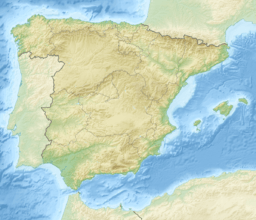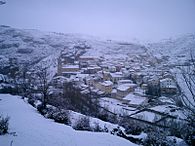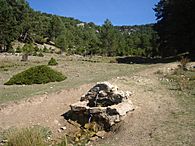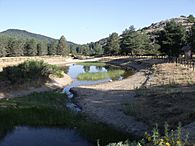Montes Universales facts for kids
Quick facts for kids Montes Universales |
|
|---|---|
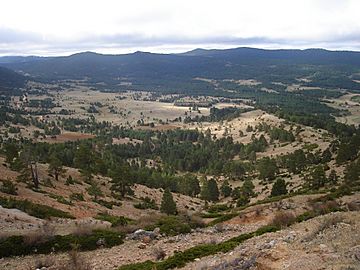
View of the Montes Universales near Guadalaviar town
|
|
| Highest point | |
| Elevation | 1,935 m (6,348 ft) |
| Listing | List of mountains in Aragon |
| Geography | |
| Location | Sierra de Albarracín Comarca, Aragon |
| Parent range | Iberian System, Southern zone |
| Geology | |
| Mountain type | Karstic (Mesozoic) |
| Climbing | |
| Easiest route | From the towns of Guadalaviar or Villar del Cobo |
The Montes Universales is a mountain range about 32 kilometers (20 miles) long. It is located at the southeastern end of the Iberian System in Spain.
The highest point in this range is a peak called Caimodorro, which stands 1,935 meters (6,348 feet) tall. Another important peak is Muela de San Juan, reaching 1,830 meters (6,004 feet).
These mountains are part of the Sierra de Albarracín area in Aragon. People sometimes confuse the Montes Universales with the larger geographical Sierra de Albarracín mountain range.
Geography of Montes Universales
The Montes Universales range stretches from the northwest to the southeast. It is not as high as some nearby mountain ranges. However, it is very important for its rivers. Many major rivers in the Iberian Peninsula start here.
These mountains act like a natural wall, dividing the waters that flow to the Atlantic Ocean from those that flow to the Mediterranean Sea. Some of the most important rivers that begin in the Montes Universales include:
- The Tagus River on the western slopes.
- The Túria River, Cabriel River, and Xúquer River on the eastern slopes.
The Montes Universales are surrounded by other natural features. To the northeast, you'll find the old paleozoic mountains of Caimodorro and Loma Alta. To the southeast is the Serranía de Cuenca. To the east are the Sierra de Jabalón and the Túria Valley.
Plants and Animals
The Montes Universales are covered with forests, though they are not always very dense. You can find different types of trees here, such as:
Scientists have studied samples from a place called Ojos del Tremedal. These studies show that birch trees were very common in these mountains about 9,600 years ago, during the ice age. Today, there are almost no birch trees left here. Signs that humans started changing the plants in this area have been found from about 3,500 years ago.
A special kind of butterfly called the Zapater's ringlet (Erebia zapateri) lives only in these mountains. This means it is an endemic species to the Montes Universales.
Features of the Mountains
-
Villar del Cobo village under the Montes Universales during a winter snowstorm
-
Montes Universales. The Turia River in the stretch known as Guadalaviar River until Teruel city.
-
Tagus River source
See also
 In Spanish: Montes Universales para niños
In Spanish: Montes Universales para niños
 | Toni Morrison |
 | Barack Obama |
 | Martin Luther King Jr. |
 | Ralph Bunche |


